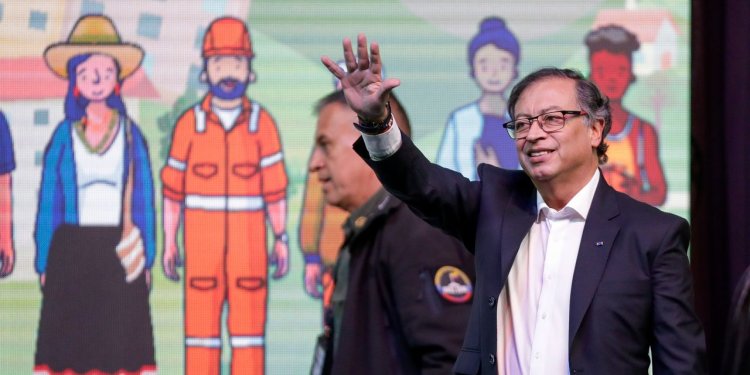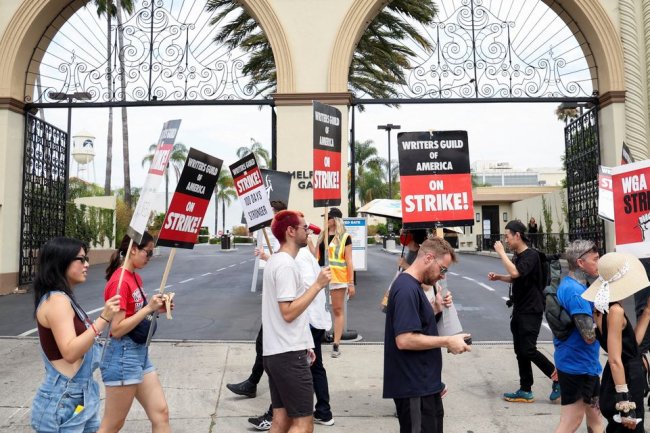Colombia’s Government and Leftist Rebels Begin Cease-fire
The cease-fire is part of a broad peace strategy to get talks with several armed groups on track The Colombian government, led by President Gustavo Petro, will curtail military operations during the talks. Photo: Ivan Valencia/Associated Press Updated Aug. 4, 2023 4:19 pm ET BOGOTÁ, Colombia—President Gustavo Petro has embarked on a bilateral cease-fire with Colombia’s oldest rebel group as part of a new strategy to negotiate with multiple rebel and drug groups. Petro’s so-called Total Peace strategy is centered on the idea of carrying out talks with the leftist National Liberation Army, a Cuba-inspired group fighting the state since 1964; remnants of the Revolutionary Armed Forces of Colombia, or FARC, that didn’t participate in talks that ended in a 2016 peace accord and assorted narco-trafficking outfits. The government


The Colombian government, led by President Gustavo Petro, will curtail military operations during the talks.
Photo: Ivan Valencia/Associated Press
BOGOTÁ, Colombia—President Gustavo Petro has embarked on a bilateral cease-fire with Colombia’s oldest rebel group as part of a new strategy to negotiate with multiple rebel and drug groups.
Petro’s so-called Total Peace strategy is centered on the idea of carrying out talks with the leftist National Liberation Army, a Cuba-inspired group fighting the state since 1964; remnants of the Revolutionary Armed Forces of Colombia, or FARC, that didn’t participate in talks that ended in a 2016 peace accord and assorted narco-trafficking outfits.
The government and the National Liberation Army, or ELN, agreed to begin a six-month-long cease-fire that started Thursday, with a possible renewal if negotiations are on track. The government will curtail military operations during the talks.
“You don’t make peace between armed sides,” Petro, who was a member of the M-19 guerrilla group that disarmed in 1990, said in a speech earlier this week. “Peace happens in a Colombian society that is unarmed and that agrees to get along.”
The U.S. on Wednesday joined other members at the U.N. Security Council to unanimously agree to authorize the world body to verify the cease-fire with the ELN. But a State Department spokesperson on Thursday said “we remain skeptical of the ELN’s intention to adhere to the terms of the agreement and to cease hostilities against civilians.”

In La Parada, a Colombian hamlet bordering the Venezuelan city of San Antonio del Táchira, the inhabitants live in fear due to the increase in violence by guerrilla groups and drug traffickers.
Photo: mario caicedo/Shutterstock
Under Juan Manuel Santos, president from 2010 to 2018, Colombia negotiated with the FARC for four years in an effort to end a 50-year guerrilla insurgency that had claimed tens of thousands of Colombian lives. At the same time, he aimed to weaken the group with military strikes. Military analysts say that strategy so hobbled the insurgency that it agreed to peace, disarming thousands of fighters and dismantling units steeped in trafficking cocaine to the U.S.
Petro has broken with that policy by proposing to rebel groups and cocaine-smuggling groups, such as the vicious Gulf Clan, that it would roll back military operations in exchange for negotiations. His peace team has been feverishly working to get negotiations started with the goal of reaching accords as fast as possible, say government officials.
In past efforts “negotiations have always been limited to one armed group, with the other groups left at the sidelines,” said Danilo Rueda, the government’s high commissioner for peace. “And that has led other groups to expand territorially.”
Rueda said the government wants to achieve peace in the three years left in Petro’s term.
“That’s the goal, to do it in this government, to show the country that talks, based on respect for life, will lead to the conditions for peace,” said Rueda. “These talks have as a starting point that you cannot torture, disappear people, or kill,” he said. The government’s plans, though, have faced serious challenges.
Petro lifted the cease-fire with the Gulf Clan in March, after accusing the group of widespread violence. The army has now deployed thousands of troops against the group in northern Colombia, where it is centered. The group remains robust, Colombian government officials say, even though some of its top leaders have in recent years been killed or extradited to the U.S. in operations in which American intelligence was essential.
After the government accused another group made up of former FARC fighters, the so-called Central Staff, of killing four indigenous children, Petro ended the cease-fire in four provinces. Still, the attorney general’s office has lifted warrants against top commanders so the government can begin talks with that group.

President Gustavo Petro has proposed to rebel groups and cocaine-smuggling groups that it would roll back military operations in exchange for negotiations.
Photo: -/Agence France-Presse/Getty Images
A cease-fire with the National Liberation Army, which agreed to suspend military activities against the state on Thursday, will be tricky.
The ELN, as it is known, is loosely organized, not a top-down group like the FARC, with many of its units operating with autonomy. Efforts to advance peace talks in the past have failed, the latest in 2019 when the government accused the group of detonating a bomb at a policy academy, killing 22 cadets.
Even now, with the cease-fire, the group’s leaders haven’t agreed to end the activities that fund the ELN, including kidnapping, extortion and drug trafficking.
“The organization cannot debilitate itself strategically,” an ELN commander participating in negotiations, Víctor Orlando Cubides, told reporters Thursday. “The financial activities continue.”
Frank Pearl, a negotiator in talks with the FARC in the Santos government, said that by implementing a cease-fire now, the government is giving the ELN a chance to strengthen its forces even as it is in talks, since it won’t be under military pressure.
And holding simultaneous talks with several armed groups is extremely challenging, Pearl said, because the two sides have to agree on complex issues that can normally take years. They include how to deliver justice to war-crime victims, how to disarm thousands of fighters, what economic benefits former rebels should receive, and what concessions should be made to guerrilla commanders to give up the fight.
“Doing it all at once makes it more complex,” Pearl said. “The advantage is if it works, you can achieve it and have peace quickly. The downside is if it doesn’t, you can lead to some groups having grown stronger in some regions.”
The cease-fire was accompanied Thursday by a gathering at Bogotá’s convention center of leaders from indigenous communities and farmers from rural areas where the ELN has operated. The rebel group and government have agreed to forums for ordinary Colombians—running parallel to the peace negotiations with the government—in which they can propose economic and political changes they want to see in Colombia.

Petro’s peace team has been feverishly working to get negotiations started with the goal of reaching accords as fast as possible.
Photo: VANNESSA JIMENEZ/REUTERS
Among those who made it to the capital is Julian Ramirez, who journeyed 18 hours by foot and bus with others from his U’wa indigenous hamlet in eastern Colombia, which has for years been caught in the middle of the conflict.
He spoke of how the guerrillas had traumatized his family, but also how the government had not delivered services to his community, like schools and roads. If peace advances, he said, he hopes to see that kind of infrastructure in his community.
“I hope this president comes through,” he said. “It’s a real opportunity for us to put the fighting behind us.”
So far this year, several regions of Colombia have been hit hard by violence, with rebels and drug trafficking groups—which Petro wishes to engage in talks—killing soldiers and policemen, blowing up oil pipelines and burning trucks on highways.
Iván Velásquez, the defense minister, said that the combat among armed groups is leading some commanders and fighters to reconsider their dangerous livelihood.
“Some of them have said it publicly,” he said. “Several of them have raised this possibility of reducing or ending their activities as an expression of their real desire for peace.”
One young commander, who is now part of a group of former FARC rebels and wore a black baseball cap and carried an assault rifle, noted that ELN fighters had pounded his men, and he wished to end the violence.
“We can make a good effort,” he said in a recent interview in a remote, northeast province. “We need to gamble on it because the FARC has always said that we look for peace but with real solutions,” he said.
—Kejal Vyas and Jenny Carolina Gonzalez contributed to this article.
Write to Juan Forero at [email protected]
What's Your Reaction?













